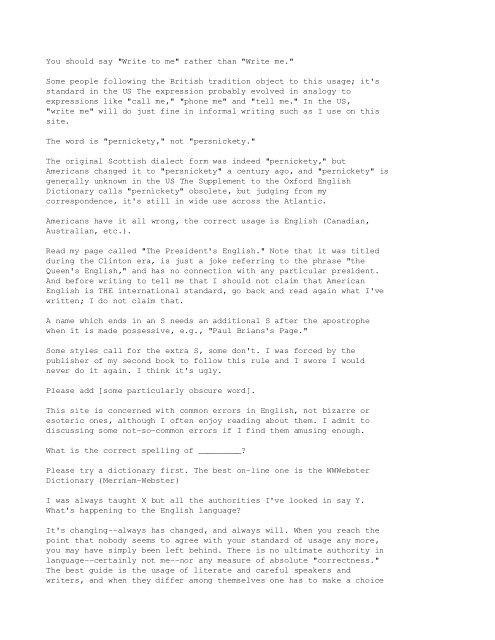Common_Errors_in_English_usage
Common_Errors_in_English_usage
Common_Errors_in_English_usage
You also want an ePaper? Increase the reach of your titles
YUMPU automatically turns print PDFs into web optimized ePapers that Google loves.
You should say "Write to me" rather than "Write me."<br />
Some people follow<strong>in</strong>g the British tradition object to this <strong>usage</strong>; it's<br />
standard <strong>in</strong> the US The expression probably evolved <strong>in</strong> analogy to<br />
expressions like "call me," "phone me" and "tell me." In the US,<br />
"write me" will do just f<strong>in</strong>e <strong>in</strong> <strong>in</strong>formal writ<strong>in</strong>g such as I use on this<br />
site.<br />
The word is "pernickety," not "persnickety."<br />
The orig<strong>in</strong>al Scottish dialect form was <strong>in</strong>deed "pernickety," but<br />
Americans changed it to "persnickety" a century ago, and "pernickety" is<br />
generally unknown <strong>in</strong> the US The Supplement to the Oxford <strong>English</strong><br />
Dictionary calls "pernickety" obsolete, but judg<strong>in</strong>g from my<br />
correspondence, it's still <strong>in</strong> wide use across the Atlantic.<br />
Americans have it all wrong, the correct <strong>usage</strong> is <strong>English</strong> (Canadian,<br />
Australian, etc.).<br />
Read my page called "The President's <strong>English</strong>." Note that it was titled<br />
dur<strong>in</strong>g the Cl<strong>in</strong>ton era, is just a joke referr<strong>in</strong>g to the phrase "the<br />
Queen's <strong>English</strong>," and has no connection with any particular president.<br />
And before writ<strong>in</strong>g to tell me that I should not claim that American<br />
<strong>English</strong> is THE <strong>in</strong>ternational standard, go back and read aga<strong>in</strong> what I've<br />
written; I do not claim that.<br />
A name which ends <strong>in</strong> an S needs an additional S after the apostrophe<br />
when it is made possessive, e.g., "Paul Brians's Page."<br />
Some styles call for the extra S, some don't. I was forced by the<br />
publisher of my second book to follow this rule and I swore I would<br />
never do it aga<strong>in</strong>. I th<strong>in</strong>k it's ugly.<br />
Please add [some particularly obscure word].<br />
This site is concerned with common errors <strong>in</strong> <strong>English</strong>, not bizarre or<br />
esoteric ones, although I often enjoy read<strong>in</strong>g about them. I admit to<br />
discuss<strong>in</strong>g some notsocommon errors if I f<strong>in</strong>d them amus<strong>in</strong>g enough.<br />
What is the correct spell<strong>in</strong>g of _________?<br />
Please try a dictionary first. The best onl<strong>in</strong>e one is the WWWebster<br />
Dictionary (MerriamWebster)<br />
I was always taught X but all the authorities I've looked <strong>in</strong> say Y.<br />
What's happen<strong>in</strong>g to the <strong>English</strong> language?<br />
It's chang<strong>in</strong>galways has changed, and always will. When you reach the<br />
po<strong>in</strong>t that nobody seems to agree with your standard of <strong>usage</strong> any more,<br />
you may have simply been left beh<strong>in</strong>d. There is no ultimate authority <strong>in</strong><br />
languagecerta<strong>in</strong>ly not menor any measure of absolute "correctness."<br />
The best guide is the <strong>usage</strong> of literate and careful speakers and<br />
writers, and when they differ among themselves one has to make a choice





